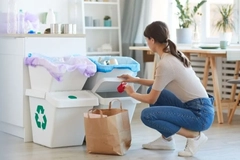Recycling is not a silver bullet: TIPA CEO flags need for alternatives to plastic packaging at Davos 2020
“Compostable packaging could be the solution to plastics conundrum,” says TIPA CEO

21 Jan 2020 --- The World Economic Forum’s (WEF) annual rendezvous at Davos is in full swing this week, with sustainability at the top of the agenda. When it comes to packaging, the shift towards reducing plastic is more pronounced than ever with governments making moves to eliminate plastic waste globally. Compostable packaging company TIPA’s CEO and Co-Founder Daphna Nissenbaum addressed, today at WEF, the issue of worldwide plastic pollution. Speaking to PackagingInsights, Nissenbaum says “we are all under the impression that every piece of plastic can be recycled, but it is not. Recycling is not one answer to all packaging.”
Sustainability in packaging is a matter where both industry and policy need to act synergistically, Nissenbaum emphasizes. “Policy can support sustainable infrastructure and provide regulation that allows innovative, tested technologies to thrive and industry must capitalize on sustainable technology in order to survive into the future.”
Last year, during WEF 2019, TIPA was named a Technology Pioneer, further establishing its position as an important player in the sustainable packaging realm. Honoring this title, TIPA joins other companies at Davos this year, which are involved in the design, development and deployment of new technologies and innovations that have a significant impact on the economy and society.
Contextualized by a world that is educated on the environmental consequences of plastic but has yet to turn off the plastic tap, TIPA seeks to highlight innovations that can curb reliance on plastic.
“In the near future, we will see a variety of solutions including composting, reusing, new materials and recycling. Compostable packaging has all the qualities which make it the right solution for flexible packaging for food and fashion,” Nissenbaum says.
 TIPA’s CEO and Co-Founder Daphna Nissenbaum at Davos 2020. Photo Credits: TIPA“We find that consumers are the ones asking for this change. We have started to see countries requiring that brands and end-consumers pay the real price of waste treatment, and in this case, compostable packaging has the advantage of having an end-of-life solution built into the package,” she adds.
TIPA’s CEO and Co-Founder Daphna Nissenbaum at Davos 2020. Photo Credits: TIPA“We find that consumers are the ones asking for this change. We have started to see countries requiring that brands and end-consumers pay the real price of waste treatment, and in this case, compostable packaging has the advantage of having an end-of-life solution built into the package,” she adds.
Compostable packaging to take the lead
According to the TIPA CEO, the demand for packaging, in general, has never been higher, but conventional plastic packaging is becoming less and less legitimate as a solution because of its disposal in landfills and natural ecosystems, and its harmful end-of-life. “We’re already seeing the market advancing sustainable packaging alternatives that address the end-of-life of packaging, like compostable packaging,” she says.
Founded in 2010 to address the global problem of plastic waste, TIPA produces compostable packaging solutions for food, mail order, retail and luxury goods markets.
“There is great intention being put into the design of our packages in order to avoid waste and pollution, and part of what is incredible about TIPA is that our packaging acts just like organic waste. It is combined with other organic waste to support healthier waste streams such as organic compost,” Nissenbaum explains.
Compostable films and laminates can be manufactured using existing machinery, so production is the same as current packaging processes, she adds. However, like any breakthrough technology, the initial price is more expensive. “Today, compostable packaging prices are declining and as this continues, they will come into balance with the market,” she notes.
Compostable packaging is often confused for being the same as biodegradable, but they are indeed quite different. Nissenbaum says that biodegradable is a term that has been under growing scrutiny lately for its lack of clarity about its end-of-life.
She further explains that biodegradation is a biological process in which materials are metabolized into CO2, water and biomass, with the help of microorganisms. Compostability is also the biodegradation of organic matter but describes a more specific process where a material biodegrades within a time frame of 180 days under composting conditions – high humidity, high temperature and the presence of microorganisms and bacteria.
“Unlike biodegradation, compostable is a term that is obligated in international standards which require the product to break down within six months under compost conditions,” Nissenbaum concludes.
The move away from plastic
Globally the move towards more sustainable practices across all sectors is noticeable. Plastic packaging and plastic paraphernalia are a focus area for many governments worldwide that seek to reduce plastic waste volumes and its adverse environmental impact. Over the past weekend, China announced a halt on both the production and use of single-use plastic products, which will be gradually implemented by 2025.
Thailand has also announced a ban on plastic bags in all its major retailers that will be fully implemented by 2021. Indonesia’s capital Jakarta is also set to ban the use of plastic bags in the retail sector by June this year.
In Europe, great attention has been given to the matter. Last March, the European Parliament voted to approve a sweeping ban – The Single Use Plastics Directive (SUDP) – of the ten single-use plastics that are most commonly found on European beaches, as well as abandoned fishing gear and oxo-degradable plastics – materials that contribute to microplastic pollution. The issue was reportedly reinvestigated earlier this month, with the EU Commission considering further bans on plastic packaging and new requirements for manufacturers. The Commission will be targeting microplastics and recycled plastic use.
By Kristiana Lalou











